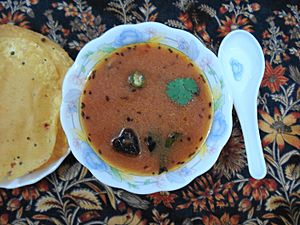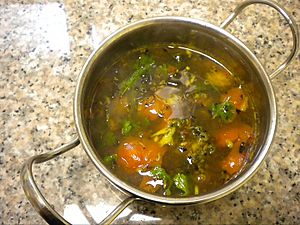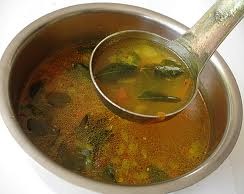Rasam (dish) facts for kids
 |
|
| Alternative names | Saaru, saathamudhu, chaaru, chaatambde |
|---|---|
| Place of origin | India, Andhra Pradesh, Tamil nadu |
| Region or state | Tamil Nadu, Andhra Pradesh, Karnataka, Kerala, Maharashtra, Telangana, Odisha |
| Serving temperature | Hot |
| Main ingredients | kokum, kadam, jaggery, tamarind, tomato, lentil |
Rasam is a yummy, spicy soup from South India. It's often served hot. People usually eat it with rice, but you can also enjoy it on its own. It's a key part of a traditional South Indian meal, often eaten with other dishes like sambar rice. Rasam has a special taste and is thinner than sambar. You can even find chilled versions or rasam paste in stores!
A type of rasam is a soup called mulligatawny, which is popular in Tamil Nadu.
What is Rasam?
The word Rasam means "essence" or "juice" in languages like Malayalam and Tamil. In Kannada, it's called Tili sāru, and in Telugu, it's chāru.
In homes across South India, rasam usually means a soup made with a sweet and sour liquid. This liquid comes from fruits like kokum or tamarind, along with tomato and lentils. Spices and fresh herbs are added to give it flavor.
The name rasam comes from the ancient Sanskrit word rása, which also means sap, juice, or essence.
What Goes Into Rasam?
Rasam is mainly made with a special sour base. This base can come from kokum, Malabar tamarind (also called kudam puli), regular tamarind, or even dried green mango (called amchur). The choice depends on where it's made.
Often, tomatos and lentils (like split yellow pigeon peas, or Toor dal) are added, but they are not always needed.
Many different ingredients are used to give rasam its amazing flavor. These can include jaggery (a type of sugar), cumin, black pepper, turmeric, mustard seeds, lemon, chili powder, curry leaves, garlic, shallots, and coriander. These are used for both flavor and as a garnish.
Different Kinds of Rasam
There are many different types of rasam, each with its own main ingredients. Here are a few examples:
- Koẕi rasam – made with chicken
- Kaḍalai rasam – made with black chickpeas
- Venkāya rasam – made with eggplant
- Kattu sāru – made with lentils and special chilies
- Huruli sāru - made from horsegram
- Tili sāru – made from the water used to sieve plain rice
- Thakkāḷi rasam – made with tomato puree
- Pūndu rasam – made with garlic
- Inji rasam – made with ginger
- Panasa tona charu - made with ripe jackfruit
- Mudakathān rasam – made with balloon vine
- Māngā rasam – made with raw or semi-ripe mango
- Elumichai rasam – made with lemon juice
- Nellikkāi rasam – made with Indian gooseberry
- Murungai pū rasam – made with drumstick flower
- Vēpam pū rasam – made with neem flower
- Kandathippili rasam – made with greens
- Bassāru/kattu sāru – made with boiled vegetables, greens, or lentils
- Miḷagu rasam (mulligatawny) – made with lots of black pepper
- Jīraga rasam – made with cumin
- Beetroot rasam – made with beetroot
- Black pepper sāru – made with Black pepper
- Puḷi rasam – made with kokum or tamarind extract
- Hesaru kālu sāru – made with green gram
- Paruppu rasam / pappu sāru – made with pulses and tomato
- Baellae sāru – made with pigeon pea lentils
- Kattina sāru – made with jaggery
- Mysore rasam – made with fried lentils
See also
 In Spanish: Rasam para niños
In Spanish: Rasam para niños
 | Victor J. Glover |
 | Yvonne Cagle |
 | Jeanette Epps |
 | Bernard A. Harris Jr. |



